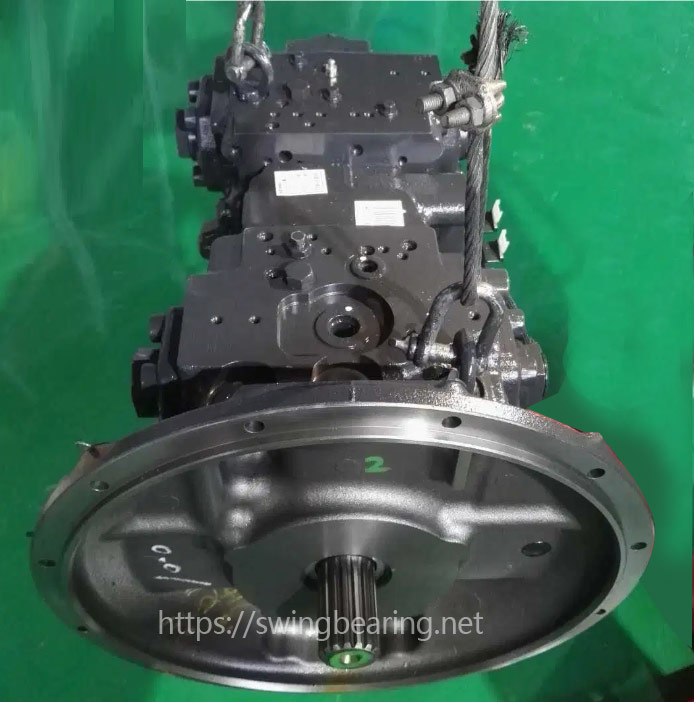
Hydraulic pumps are crucial components in excavators like the PC1250, responsible for powering various hydraulic functions essential to its operation. Identifying signs of hydraulic pump failure early can prevent costly repairs and downtime. This blog will explore the symptoms, causes, and actions to take when facing hydraulic pump issues with the PC1250 excavator.
The hydraulic pump in a PC1250 excavator is vital for converting mechanical power into hydraulic power, enabling the machine to perform heavy-duty tasks efficiently. However, like all mechanical components, hydraulic pumps can experience wear and failure over time. Recognizing the symptoms of a failing hydraulic pump is crucial for maintaining optimal performance and preventing further damage.

Diagnosing hydraulic pump issues requires a systematic approach to pinpoint the root cause accurately. Here are steps to troubleshoot and address common problems:
Maintaining the hydraulic pump in a PC1250 excavator is essential for ensuring peak performance and longevity of the machine. By recognizing the symptoms of a failing hydraulic pump early and following a structured troubleshooting process, operators and maintenance teams can minimize downtime, reduce repair costs, and extend the life of the excavator.
Hydraulic pump failure in an excavator like the PC1250 can lead to significant downtime and costly repairs. Preventive maintenance is key to ensuring reliable operation and extending the lifespan of hydraulic components.
Regular monitoring of hydraulic fluid quality and levels is crucial. Hydraulic fluid acts as a medium for power transmission and lubrication within the hydraulic system. Contaminated or degraded fluid can accelerate wear on pump components, leading to decreased performance and potential failure.
Monitoring Hydraulic Fluid Quality: Regularly check the color, viscosity, and cleanliness of hydraulic fluid. Use recommended testing kits or tools to analyze fluid condition, checking for contaminants like dirt, metal particles, or water. Contaminated fluid should be promptly replaced to prevent damage to pump components.
Conducting Routine Inspections: Inspect hydraulic lines, fittings, and hoses for signs of leaks, wear, or damage. Ensure all connections are secure and free from corrosion. Inspect hydraulic filters and replace them as recommended by the manufacturer to maintain efficient fluid filtration.
Following Manufacturer-Recommended Maintenance Schedules: Adhere to scheduled maintenance intervals provided by the manufacturer. These schedules include tasks such as fluid changes, filter replacements, and comprehensive system inspections. Following these guidelines helps catch potential issues early and ensures that the hydraulic pump operates at peak efficiency.
Recognizing symptoms of hydraulic pump problems early can prevent more extensive damage and costly repairs. If you notice unusual noises, fluid contamination, or other signs of malfunction, take immediate action to diagnose and address the issue.
Cease Operation Immediately: Stop using the excavator if you suspect hydraulic pump issues. Continuing to operate with a compromised pump can exacerbate damage and lead to system failure.
Visual Inspection: Visually inspect the hydraulic pump, lines, and reservoir for leaks, visible damage, or signs of fluid contamination. Look for discoloration or foaming in the hydraulic fluid, which can indicate water or air ingress.
Perform Diagnostic Tests: Use diagnostic tools to measure hydraulic pressure, flow rates, and temperature. Compare readings to manufacturer specifications to identify deviations that may indicate pump inefficiency or failure.
Consult with a Qualified Technician: Engage a trained technician specializing in hydraulic systems to diagnose and repair the issue. They can conduct more advanced tests and inspections, such as pump disassembly and component analysis, to pinpoint the root cause of the problem.
Repair or Replace as Needed: Based on the technician’s assessment, undertake necessary repairs or replace damaged components promptly. Use genuine parts recommended by the manufacturer to ensure compatibility and performance.
Hydraulic fluid replacement frequency is critical to maintaining optimal system performance and longevity. The replacement interval depends on operating conditions and manufacturer recommendations.
Manufacturer Guidelines: Follow the hydraulic fluid replacement intervals specified by the excavator’s manufacturer. These guidelines account for factors such as operating hours, environmental conditions, and type of hydraulic fluid used.
Severe Operating Conditions: In harsh environments with high temperatures, dust, or humidity, consider more frequent fluid changes. Severe conditions can accelerate fluid degradation and increase the risk of contamination, compromising pump performance.
Regular Fluid Analysis: Conduct regular fluid analysis through laboratory testing or on-site kits. Analyzing hydraulic fluid helps monitor its condition, detect contaminants early, and determine when